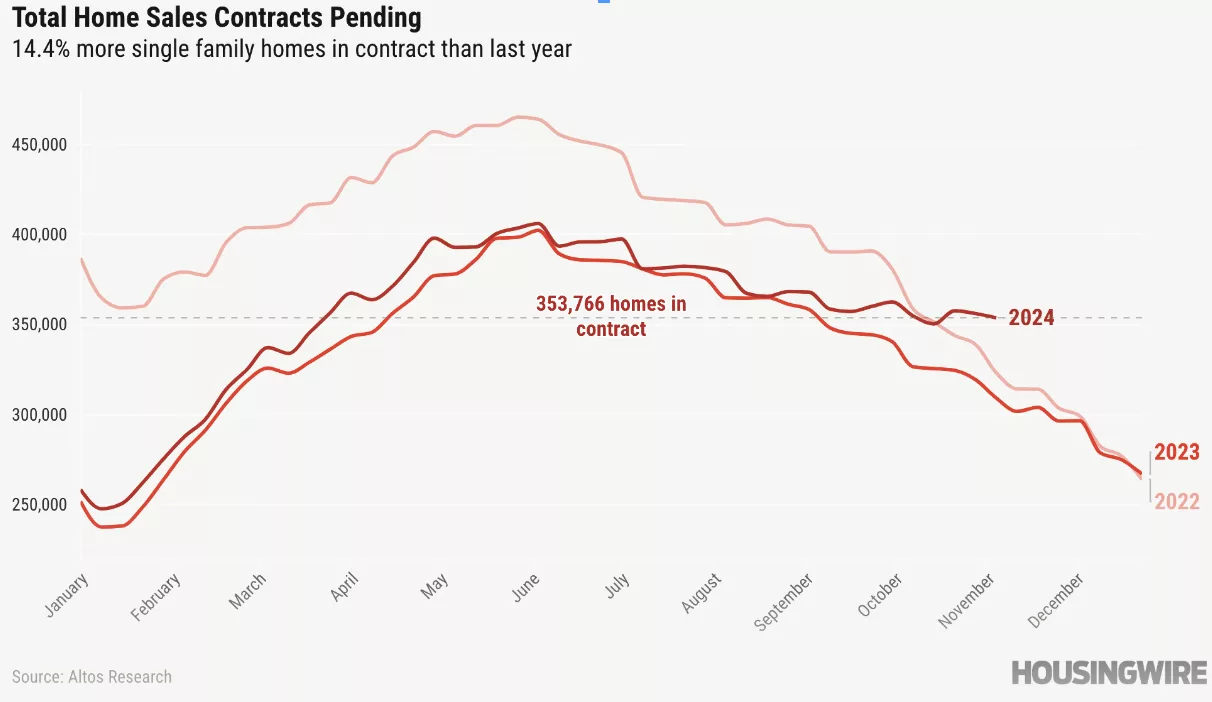
By John Engel
Last week we talked about the empirical effect of elections on real estate. We observed soft even years and stronger odd years. Elections represent inflection points before which we freeze with indecision and after which we exhale, and life goes on. Now that we know the results of the election what does the future hold for our investments in real estate?
For the past two years any discussion of real estate has been dominated by discussion of Fed action and mortgage rates. I say much ado about nothing because it really hasn’t moved the needle on home sales around here and values continue to rise. I say again rates are not the most important driver. Supply is. New York City seems to be more sensitive to rate cuts than Fairfield County or Palm Beach. But NYC is a much more balanced market. Maybe rate cuts will have a greater effect in a more balanced market. Now, with the pivot behind us, the election behind us, what next for our housing market?

Tariffs. Trump won and said he will tax 10% on imports (and 25% to 60% on Chinese and Mexican imports). Will he? Trump imposed $80 billion of new taxes during his last administration, and Biden kept them in place, adding $3.6 billion more on semiconductors and electric vehicles. The effect of those past tariffs has been to reduce our GDP by 0.2 percent (see taxfoundation.org) Proposed tariffs are larger, and expected to reduce GDP by another 0.8%. That could have a detrimental effect on our market. Whether or not they pass the effect of the rhetoric has already slowed down planned factory-building, including a Tesla gigafactory in Mexico. Tariffs are inflationary because they add inefficacy to a global market, raising the cost of building and renovating our homes. If passed, this will have a chilling effect on the real estate market nationally. But, how so in Fairfield County? Those cedar roofs we love are imported from Canada. 27% of our copper comes from Chile and 12% from Peru. $37.7 billion in household appliances were imported in 2023. Taxing these parts of our homes has got to have an inflationary impact and slow home building in the area.
Fed Action. Rising inflation will also cause the Fed to slow down on rate cuts, having a further chilling effect on the real estate market. The two rate cuts this Fall since the pivot have not resulted in lower mortgage rates in the last two months. In fact, they’ve been above 6% for the last two years and will probably stay there for the foreseeable future, “higher for longer”. Why? Mortgage rates are much more affected by the bond market than by Fed action and the bond market is telling us the economy is too strong, inflation too persistent, the deficit too high and demand for government bonds too weak for rates to come down. Expect Fed action (and inaction) to have little to no impact on the Fairfield County spring market.

First Lieutenant Joe Colavito, Army National Guard First Lieutenant Colin Ng, (who is also a
teacher at WestHills High School in Stamford), Army National Guard Sargeant First Class
Matthew Blank (who is also the School Resource Officer for Saxe Middle School)
Tax cuts. Specifically, expiration of the SALT TAX caps of 10%. The 2017 Tax Cuts and Jobs Act (TCJA) imposed a $10,000 cap on SALT deductions, putting some of the most stringent limitations on the deduction in its 100-plus year history. The tradeoff for many taxpayers was a higher standard deduction, which TCJA doubled. The law benefited homeowners with smaller tax bills and harmed those of us in high-tax areas. Both the SALT limitations and the doubled standard deduction expire after 2025, putting SALT on the 2025 menu for lawmakers. If the caps expire this will represent a windfall for homes in this area, particularly high-tax Westchester County. While Fairfield County market has been the beneficiary of Westchester flight, the law caused Fairfield County to lose many wealthy homeowners to low-tax southern states. Ironically, in some Florida markets the rapid appreciation of real estate values and re-assessed property taxes wiped out any tax benefits on day one. In any event, expiration of the SALT cap is a big deal for the real estate market in our area. The ability for the average New Canaan homeowner to take an additional $10,000 deduction from her taxes is enough to move the market.
Stock Market. The Trump win was good for Wall Street. The S&P was up 4.66% last week, and stocks like JP Morgan and Wells Fargo joined Tesla (up 29%) in experiencing big rallies. The expectation driving the stock market rally is that Trump is for de-regulation, lower taxes and cheap energy the combination of which will have a sustained and beneficial effect on earnings. But, what about our homes? New Canaan, and the entire lower Fairfield County market is disproportionately dependent on Wall Street and a strong stock market will result in a strong housing market here. Wall Street bonuses, and stock market gains are often overlooked, but remain one of the biggest reasons for our homes retaining their values. Since Wall Street bonuses are announced just after the first of the year, expect the short-term effect of a strong stock market to play out in an earlier-than-usual Spring Market, beginning February 1, 2025.

Lock-In Effect. The lock-in effect of low rates diminishes over time. Supply will continue to increase. Many of the other factors we’ve mentioned, particularly inflation and rising home prices in markets where New Canaanites like to retire have caused some potential sellers to postpone their plans, but as time marches on sellers move from thinking to doing.
Notes from Monday: Saxe Middle School welcomed New Canaan’s Veterans on Monday. There is no better reminder of why this town is great, why we move to this town, and stay, than when you can experience the interaction between octogenarian Korean War veterans and 5th graders, all of whom were engaged and curious. School safety officer Matt Blank led us in the program. Matt happens to be an Army veteran who has recently served on the horn of Africa, keeping ship traffic moving through the Gulf of Oman.
John Engel is a broker with the Engel Team at Douglas Elliman in Connecticut and a veteran of Desert Storm, the first Gulf War. Engel was asked by a 5th grader if there are “girls” in the Army. Yes, 40% of Engel’s platoon, the tip of 1st Infantry Division’s main attack, were women, spying on the enemy, listening to their radios, calling in their positions. Our war was over when the original objective was met. The bully was kicked out of Kuwait, something to be said about not staying too long.


